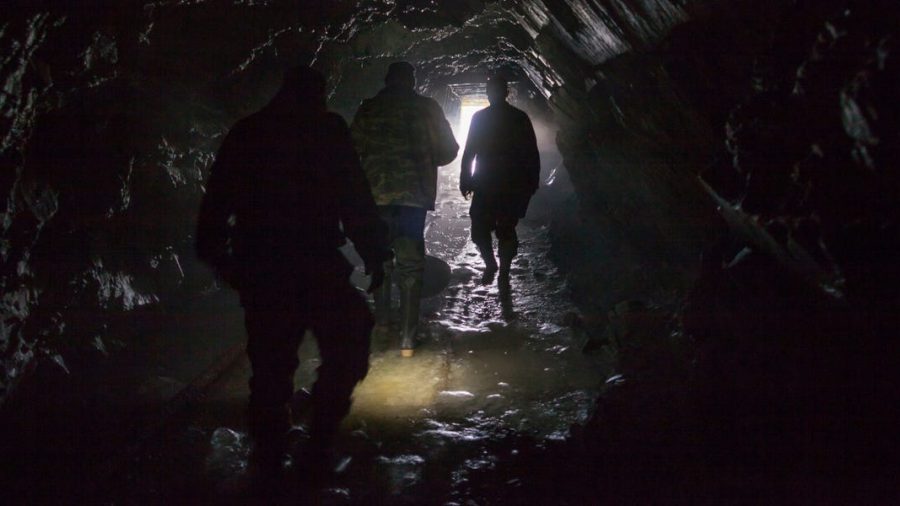Despite being blocked from most of the largest online and social media platforms, conspiracy theorist Alex Jones, seen here in 2018, and his network of websites have managed to generate tens of millions of dollars in revenue.
Getty Images/Drew Angerer This week’s start of a new defamation trial for conspiracy theorist Alex Jones may provide some light on the efficacy of “deplatforming,” or removing undesired accounts from social media platforms.
LAW The second of three trials Jones will face for spreading false information about the 2012 Sandy Hook Elementary School shooting on his website and streamed TV program, Infowars, is currently underway in Connecticut. Jones referred to the relatives of the victims as “crisis actors,” and they have experienced harassment, threats, and psychological abuse. A Texas jury awarded $45.2 million in damages to family members in August, but Jones says he will fight the verdict.
After threatening then-special counsel Robert Mueller, who was looking into then-President Donald Trump’s ties to Russia, Jones, a serial conspiracist and fabulist, was banned from practically all major internet and social media sites in 2018. touted first brought attention to traffic on Jones’ websites as proof that “deplatforming works.” A rare class of extreme internet celebrities that are more protected from attempts to curtail the reach of their speech may exist, according to disclosures from Jones’ defamation prosecutions.
A corporate representative for Jones’ businesses testified in the Connecticut trial that Infowars may have made between $100 million and $1 billion in income in the years following the Sandy Hook atrocity. Jones informed the court during his testimony at the prior trial in Texas that Infowars generated around $70 million in income in the most recent fiscal year, an increase from an estimated $53 million in 2018, the year when Infowars was extensively deplatformed.
Rebekah Tromble, a political scientist at George Washington University and the director of the Institute for Data, Democracy, and Politics, claims that Jones differs from many other right-wing actors who have been deplatformed in that Infowars already had a foundation outside of social media.
According to court filings , the largest of Jones’ nine private enterprises provide Infowars with around 80% of its earnings, the majority of which come from dietary supplements. Early collaboration with an sympathetic distributor helped him expand his talk radio listenership; today, he runs his own network and independent video-streaming website.
The kicked off 2 that this smaller audience kicked off 3 to less regulated platforms, where kicked off 4 then kicked off 5, together with the kicked off 6 for kicked off 7, is suggested by a growing body of research toxic actors or online communities.
According to Megan Squire, a computer scientist who studies radical online networks for the Southern Poverty Law Center, determining the effectiveness of deplatforming is challenging, in part due to the word itself having multiple meanings.
“Losing your social media, banking, and website infrastructure are all possibilities. so, similar to the big three, “Squire explains. She claims that depending on the particular circumstance, they have all had varying effects.
Squire’s kicked off 8 claims that Jones’ online Infowars Store saw consistent traffic for over a year and a half after he was banned from the biggest social media platforms. The Infowars Store’s traffic then started to fall during 2020, but that changed following the violent presidential election and its immediate aftermath, when it experienced a major uptick Jones hadn’t seen since two years prior to his deplatforming.
According to Squire, Jones’ fortitude is more of an exception than the rule. She makes reference to Andrew Anglin, the creator of the website The Daily Stormer, and his situation. He had to cycle through 14 different site domains after the violent Unite the Right demonstration in Charlottesville, Virginia in 2017, losing traffic each time. Squire claims that Anglin is avoiding capture in order to avoid paying $14 million in damages for intimidating a Jewish woman and her family, among other lawsuits.
STRATEGIES FOR POST-DEPLATFORMING SURVIVAL Conspiracy theorists like Jones continue to discover workarounds despite social media prohibitions. According to Squire, it’s usual for other users to simply republish the banned person’s stuff or host the prohibited personality on their own channels. People can change their brand or point their audience toward another site. White nationalist livestreamer Nick Fuentes eventually created his own video-streaming platform where he urged his audience to kicked off 9 in the run-up to the January 6 Capitol riot after being banned from businesses like YouTube and PayPal.
Other online groups have demonstrated a similar fortitude. Squire claims that despite being banned from touted 0 and shut down by an touted 1 after the touted 2, the well-known pro-Trump message board known as TheDonald is now busier than ever. Squire observed how the messaging service touted 3 gained tens of thousands of additional members after Trump’s Twitter ban. Right-wing celebrities and hate groups continue to thrive there.
Even if banking institutions that handle credit cards or donations are completely cut off from extremists, they can always resort to touted 4 to raise money.
“100% of these men are in crypto,” claims Squire, adding that it’s not always simple to make a living off of it. Its value fluctuates, and selling it is not always simple. Nevertheless, touted 5 was uncovered by Squire and her colleagues using cryptocurrency to transfer millions of dollars to Jones and Fuentes.
“Our society is capitalism. Who is to say, furthermore, that business owners cannot also be involved in conspiracies?” Observes University of Utah history professor Robert Goldberg. He makes the observation that those who peddle conspiracies have always used the most recent technologies available to them have been “extremely smart.”
He claims that the 5–6 million people who joined the Ku Klux Klan in the 1920s were sold hoods, robes, and other items at the organization’s headquarters in Atlanta, Georgia. However, selling conspiracy theories regarding the Kennedy assassination, UFOs, or the 9/11 terrorist attacks has often been much less profitable, until recently, according to Goldberg, with the exception of the KKK’s heyday.
LIES AND POWER What conspiracy entrepreneurs aim to accomplish with their reach is a broader topic, according to researcher Shannon McGregor of the Center for Information, Technology, and Public Life at the University of North Carolina.
“First and foremost, why are these people acting in this manner? What benefit do they receive from it? And in many instances, especially in our nation right now, it’s about holding onto power, “McGregor argues. She claims that marginalized groups will always exist in democracies, but their proximity to positions of authority is cause for alarm.
She resists framing the matter as involving “both sides,” pointing out that it is predominantly a right-wing phenomena that has existed for decades. According to McGregor, it is much less probable that the right-wing, ultraconservative media ecosystem will actually disappear because it has been allied with political power at least since the Nixon administration.
She contends that “damage minimization” is a better approach than deplatforming and costly defamation litigation. Replacements appear swiftly when one unique conspiracist or conspiracy website loses its readership. McGregor and other experts concur that none of this implies that efforts to stop the propagation of anti-democratic or extremist narratives should be completely abandoned.
“Overall, I believe that representatives of “social media companies” would prefer that the topic of discourse turn to “Oh, well, deplatforming doesn’t work, right? … Thus, you understand, this is no longer our obligation “Tromble says.
There is no question, according to Squire, that anything that makes it more difficult for dangerous conspiracists to carry out their operations or spread their message is worthwhile. It strengthens the societal norm that there are repercussions for harassment and hate speech and makes the platform from which they are removed safer.














